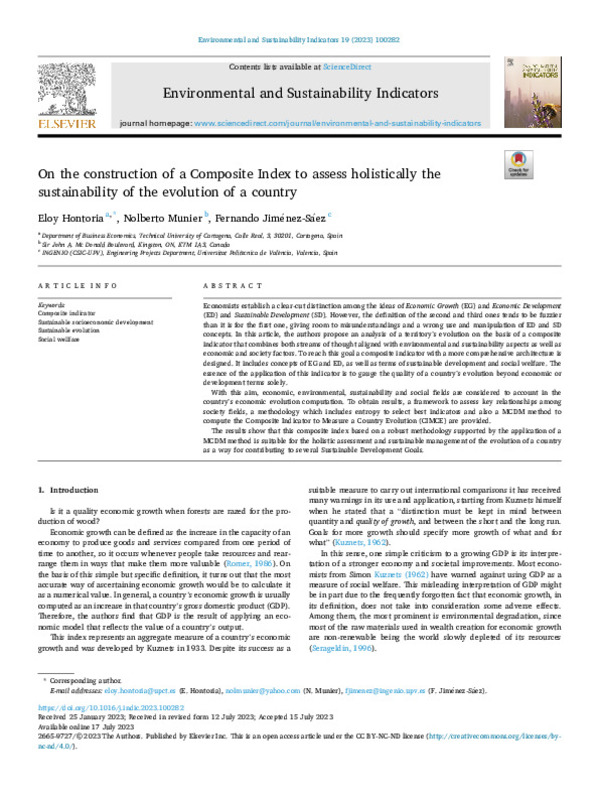JavaScript is disabled for your browser. Some features of this site may not work without it.
Buscar en RiuNet
Listar
Mi cuenta
Estadísticas
Ayuda RiuNet
Admin. UPV
On the construction of a Composite Index to assess holistically the sustainability of the evolution of a country
Mostrar el registro sencillo del ítem
Ficheros en el ítem
| dc.contributor.author | Hontoria-Hernández, Eloy
|
es_ES |
| dc.contributor.author | Munier-Buratti, Nolberto
|
es_ES |
| dc.contributor.author | Jiménez-Sáez, Fernando
|
es_ES |
| dc.date.accessioned | 2024-04-11T11:50:02Z | |
| dc.date.available | 2024-04-11T11:50:02Z | |
| dc.date.issued | 2023-09-30 | es_ES |
| dc.identifier.uri | http://hdl.handle.net/10251/203414 | |
| dc.description.abstract | [EN] Economists establish a clear-cut distinction among the ideas of Economic Growth (EG) and Economic Development (ED) and Sustainable Development (SD). However, the definition of the second and third ones tends to be fuzzier than it is for the first one, giving room to misunderstandings and a wrong use and manipulation of ED and SD concepts. In this article, the authors propose an analysis of a territory's evolution on the basis of a composite indicator that combines both streams of thought aligned with environmental and sustainability aspects as well as economic and society factors. To reach this goal a composite indicator with a more comprehensive architecture is designed. It includes concepts of EG and ED, as well as terms of sustainable development and social welfare. The essence of the application of this indicator is to gauge the quality of a country's evolution beyond economic or development terms solely. With this aim, economic, environmental, sustainability and social fields are considered to account in the country's economic evolution computation. To obtain results, a framework to assess key relationships among society fields, a methodology which includes entropy to select best indicators and also a MCDM method to compute the Composite Indicator to Measure a Country Evolution (CIMCE) are provided. The results show that this composite index based on a robust methodology supported by the application of a MCDM method is suitable for the holistic assessment and sustainable management of the evolution of a country as a way for contributing to several Sustainable Development Goals. | es_ES |
| dc.language | Inglés | es_ES |
| dc.publisher | Elsevier BV | es_ES |
| dc.relation.ispartof | Environmental and Sustainability Indicators | es_ES |
| dc.rights | Reconocimiento - No comercial - Sin obra derivada (by-nc-nd) | es_ES |
| dc.subject | Composite indicator | es_ES |
| dc.subject | Sustainable socioeconomic development | es_ES |
| dc.subject | Sustainable evolution | es_ES |
| dc.subject | Social wellfare | es_ES |
| dc.subject.classification | PROYECTOS DE INGENIERIA | es_ES |
| dc.title | On the construction of a Composite Index to assess holistically the sustainability of the evolution of a country | es_ES |
| dc.type | Artículo | es_ES |
| dc.identifier.doi | 10.1016/j.indic.2023.100282 | es_ES |
| dc.rights.accessRights | Abierto | es_ES |
| dc.contributor.affiliation | Universitat Politècnica de València. Escuela Técnica Superior de Ingenieros Industriales - Escola Tècnica Superior d'Enginyers Industrials | es_ES |
| dc.description.bibliographicCitation | Hontoria-Hernández, E.; Munier-Buratti, N.; Jiménez-Sáez, F. (2023). On the construction of a Composite Index to assess holistically the sustainability of the evolution of a country. Environmental and Sustainability Indicators. 19:1-14. https://doi.org/10.1016/j.indic.2023.100282 | es_ES |
| dc.description.accrualMethod | S | es_ES |
| dc.relation.publisherversion | https:\\doi.org\10.1016/j.indic.2023.100282 | es_ES |
| dc.description.upvformatpinicio | 1 | es_ES |
| dc.description.upvformatpfin | 14 | es_ES |
| dc.type.version | info:eu-repo/semantics/publishedVersion | es_ES |
| dc.description.volume | 19 | es_ES |
| dc.identifier.eissn | 2665-9727 | es_ES |
| dc.relation.pasarela | S\513304 | es_ES |
| dc.subject.ods | 08.- Fomentar el crecimiento económico sostenido, inclusivo y sostenible, el empleo pleno y productivo, y el trabajo decente para todos | es_ES |








